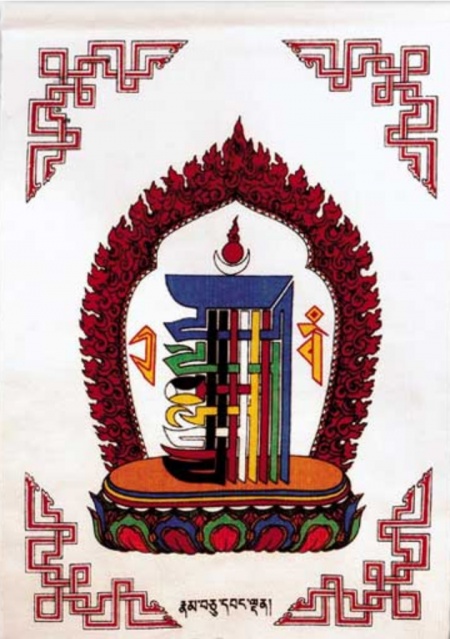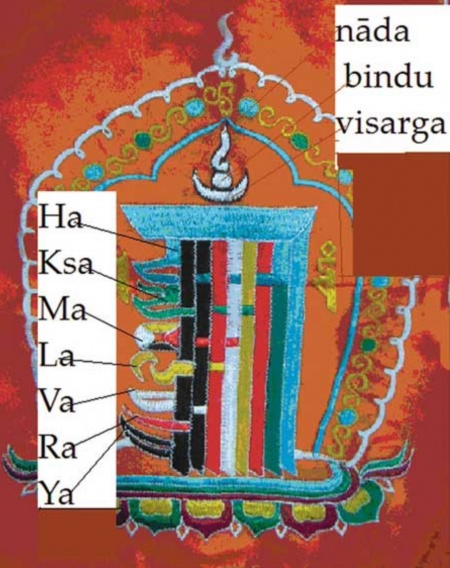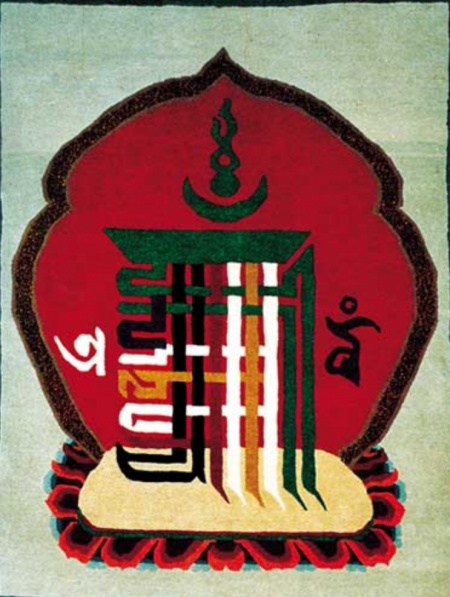Introduction of the Kalacakra Mantra-Tenfold Powerful One
Introduction of the Kalacakra Mantra-Tenfold Powerful One
by Thubten Phuntsog
The Four Natural Elements and Their Relation to the Nature of Reality and the Human Potential for Healing and Enlightenment
All phenomena are made from the four elements and thus are related in the sense of sharing the same essential nature (e.g., the four elements). Moreover, all phenomena can be classified in terms of the triad of outer, inner, and alternative things.
This principles common to most Tantric systems and is a particular feature of the Kalacakra system [meaning 'wheel of time' or even "time machine"]. The latter expounds on this triad under the rubrics of the outer, inner, and alternative Kalacakras. In its exposition of the three, the outer Kalacakra involves a presentation of the globe and cosmos; the inner Kalacakra involves a presentation of the adamantine (vajra) body; and the alternative Kalacakra involves a presentation of thusness (or the nature of reality). The Kalacakra system explains the mode in which each of the outer, inner, and alternative Kalacakras are made from the essential nature of the four elements. To give an easy to understand explanation of the way everything the triad of the inner, outer, and alternative is related in the sense of being one essence, one can map this principle out onto the monogram of the Kalacakra, known as the Tenfold Powerful One.(Namchu Wangden)
Unpacking the design of the Tenfold Powerful One in terms of the realms of the external worlds.
The monogram is composed of ten individual letters stacked together. Placed towards the bottom of the stack, the letter Ya ( heavy green color ) is a symbol of the wind element, which originates from the emptiness, it is symbol of the wind mandala, the substratum of the universe. Above that, the letter Ra (red color) is a symbol of the fire element, which originates from the heat of the forceful collisions of the winds arising from every direction of the wind mandala. The letter Va (white color ) above that is a symbol of the water mandala, which originates from the descent of the continuous rain of the dense clouds in the sky produced by the heat of the fire mandala. The letter La (yellow color ) above that is a symbol of earth mandala, which originates from the division into a triad of greatest, middling, and inferior universes that occurs because of the churning by wind of the that great mass of water. This ordered stacking of the components of the Tenfold Powerful One is a symbol of this cosmogony of the external-container world.
The letter Ma (color full ) above the preceding grouping of components is a symbol of the desire realm. The letter Ksa ( light green color ) above that is a symbol of the realm of subtle form. The letter Ha (blue color ) above that is a symbol of the formless realm. These three are symbols of the realms of the animate contents of (of the external so-called container world). The visarga (white color ) is a symbol of the moon mandala. The bindu( red color ) is a symbol of the sun mandala. The nāda ( blue color ) is a symbol of planet Rāhu
2 Unpacking the design of the Tenfold Powerful One in terms of the realms of the inner kālacakra.
The internal kālacakra the city of the adamantine body is formed with a nature of progressive stacking. This is the same way that external objects come into being, thus the nature of the coming into being of the both the internal and external kālacakras are established as essentially identical.
The aspects of the ten letters that comprise the stack of letters in the monogram can be correlated with the internal kālacakra, the city of the adamantine body. Firstly, the fluctuations of karmic winds cause the parents to come together and copulate. Therefore the letter Ya at the bottom of the stack is a symbol of the wind element. The letter Ra above that is a symbol of the fire element, and refers to the heat of desire present when the parents copulate. The letter Va above that is a symbol of the water element, and refers to the ejaculation of semen due to the intensity of the heat of desire during the copulation of the two parents. The letter La above that is a symbol of the earth element, and refers to the fetus becoming hard and obstructive, when the parents' regenerative fluids fuse in the womb. This is how the progressively stacked mandalas of elements are correlated with the internal kālacakra, the city of the adamantine body.
The letter Ma above that is a symbol of the basic constituent of the grouping of the six sensory consciousnesses (e.g., tactile, olfactory, auditory, gustatory, visual, and mental sense perceptions). The letter Ksa above that is a symbol of the basic constituent of the fulfillment of all of the aggregates, psycho-physical bases of perception, and sense-spheres. The letter Ha above that is a symbol of the basic constituent of the empty space of the openings on the exterior and interior of the body, the pathways through which bodily strength, excrement, and so forth travel. The visarga above that is a symbol of sentient beings' life force and right lateral channel. The bindu is a symbol of sentient beings' heat and left lateral channel. The nāda is a symbol of the wind and mind, and the central lateral channel.
3 Unpacking the design of the Tenfold Powerful One in terms of the realms of the alternative kālacakra.
What is indicated by the term "alternative kālacakra" is, once the essential nature of the city of the adamantine body is made manifest through achieving a state of purification as a result of the generation and completion stages of yoga, the actualization of one's nature of the three buddha bodies. Prior to this stage the essential nature of the mode of abiding of the interior of the city of the adamantine body was the essence of the three buddha bodies abiding in the mode of the channels, drops, and winds.
The aspects of the ten letters that comprise the stack of letters in the monogram can be correlated with the alternative kālacakra. The letter Ya at the bottom of the stack is a symbol of the wind element. It refers to holding the vase-breath which, after an initial stage of meditating on the winds as a way of training the channels, is the result of ceasing all movement of the winds. The letter Ra above that is a symbol of the wind element. It refers to generation physical blissful heat done in reliance on the wind mandala by the letter ram in the middle of the "ah stroke" at the navel, effected through inner heat meditation. The letter Va is a symbol of the water element. The fire of the "ah stroke" of the yoga of inner heat gradually blazes ever more intensely, with the flames reaching the crown of the head. The white drops of semen acquired at the moment of conception that have settled at the crown of the head, which are in the figure of the letter ham, melt and gradually descend, thereby filling the all of the channels in the body. The letter La above that is a symbol of the earth element. As all of the physical channels are filled up with the stream of drops descending from the crown of the head as just described, the body inflated with the meditative experiences of bliss, clarity, and non-conceptuality becomes hard and obstructive, and one attain qualities of the life-force equal to the sun and the moon.
When one gains mastery over the elemental channels, winds, and drops that abide intrinsically within the human body, numerous exceptional abilities will manifest. Not only will one be impervious to the harms of illness, weapons, and hunger, but one will have the ability to benefit the bodies of others as they require. Terminating that which is harmful to bodies is also an ability derived from the body's elements and the power to do so depends on one's skill in the internationally esteemed Tibetan yogic practices of the channels and winds. The abilities derived from these yogic practices are actually marks of accomplishment in control over the body's channels, winds, and drops.
When training in the yogic practices of the channels and winds, one must put primary emphasis on exercising the body's channels, winds, and mind. Therefore, having a good understanding of how the Tibetan medical tradition explains the formation of the body's elemental constituents such as the channels and winds will be of great benefit (in the yogic practices of) controlling the winds and mind. If one's channels and winds are robust then one enjoys good health and a long life, and is able to prevent and heal illnesses in the bodies of oneself and others. For these reasons one can be certain that these powers are derived chiefly from the elements.
The letter Ma above that is a symbol of the purification of all of the karma and habitual propensities for taking birth in the desire realm that one has accumulated from beginningless time to the present. The letter Ksa above that is a symbol of the purification of the karma and habitual propensities contained in the mental continuum for taking birth in the realm of subtle form. The letter Ha above that is a symbol of purification of the karma and habitual propensities for taking birth in the formless realm. The visarga is a symbol of skillful method and the bindu is a symbol of wisdom. The nāda is a symbol of the meaning of their coalescence: emptiness.
If you know that everything found in the outer, inner, and alternative spheres are related in the sense of sharing an essential nature, as described above, then you can lucidly understand how factors of time, provocations, food, and lifestyle create the benefits and harms of pleasure and pain in the bodies of sentient beings, together with their causes and conditions.


